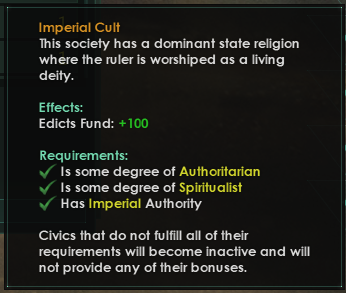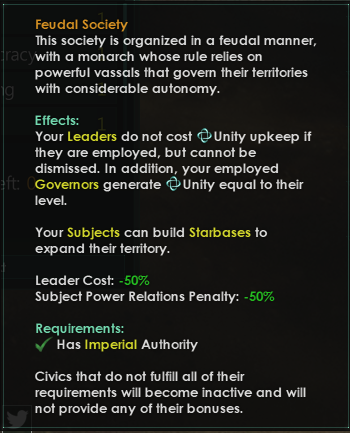Доступно на русском в ВК/Read in Russian on VK
Welcome back! We hope you’ve all had a wonderful few weeks.
Today we’ll start with some more information about the goals of the Unity Rework mentioned in Dev Diary 215 (and briefly in 234), some updates on how things have been going so far, and our plans going forward.
Please note: All values and screen captures shown here are still very much in development and subject to change.
Identified Problems and Design Goals
Currently in Stellaris, Unity is an extremely weak resource that can generally be ignored, and due to the current implementation of Admin Capacity, the Empire Sprawl mechanic is largely toothless - leading to wide tech rushing being an oppressively powerful strategy. Since Unity is currently very easily generated through incidental means and provides minimal benefits, Empires have little need to develop a Unity generation base, and Spiritualist ethics are unattractive.
Influence is currently used for many internal and external interactions, making it a valuable resource, but it sometimes feels too limiting.
Our basic design goals for the Unity Rework can be summarized as:
So What Are We Doing?
All means of increasing Administrative Capacity have been removed. While there are ways to reduce the Empire Sprawl generated by various sources, and this will be used to help differentiate gameplay between different empire types, empires will no longer be able to completely mitigate sprawl penalties. Penalties and sprawl generation values have been significantly modified.

Bureaucrats, Priests, Managers, Synapse Drones, and Coordinators will be the primary sources of Unity for various empire types. Culture Workers have been removed.
Autochthon Memorials (and similar buildings) now increase planetary Unity production and themselves produce Unity based on the number of Ascension Perks the Empire has taken. Being monuments, they no longer require workers.

These monuments are now planet-unique, and can be built by Spiritualist empires.
The Edicts Cap system has been removed. Toggled Edicts will have monthly Unity Upkeep which is modified by Empire Sprawl. Each empire has an Edicts Fund which subsidizes Edict Upkeep, reducing the amount you have to pay each month to maintain them. Things that previously increased Edict Capacity now generally increase the Edicts Fund, but some civics, techs, and ascension perks have received other thematic modifications.

As an example, some Bureaucratic technologies now modify the Edicts Fund.

The Imperial Cult will squander any excess Edicts Fund on icons of the God Emperor at the end of the month. No refunds!
Several systems that used to cost Influence are now paid in Unity.
Leaders now cost Unity to hire rather than Energy. They also have a small amount of Unity Upkeep. We understand that this increases the relative costs of choosing to hire several scientists at the start of the game for exploration purposes, or when “cycling” leader traits, as you are now choosing between Traditions and Leaders..

And then some empires go and break all the rules.
Most Megastructures now cost Unity rather than Influence, with the exception of any related to travel (such as Gateways) or that provide living space (such as Habitats and Ring Worlds).
Authority bonuses have (unsurprisingly) undergone some changes again, as several of them related to systems that no longer exist or operate differently now.
When Will This Happen?
Since these are pretty big changes that touch many game systems in so many ways, we’ve decided to put these changes up in a limited duration Open Beta on Steam for playtest and feedback. This will give us a chance to adjust values and modify some game interactions before the changes get pushed to live later on in the 3.3.x patch cycle, and we will continue improving on them in future Custodian releases.
We’ll provide more details on the specifics of how the Open Beta will be run in next week's dev diary.
What Else is Planned?
As noted earlier, we’d like Unity to also reflect the resilience of your empire to negative effects. A high Unity empire may be more resistant to negative effects deficits or possibly even have their pops rise up to help repel invaders, but these ideas are still in early development and will not be part of this Open Beta or release. They’ll likely be tied to the evolving Situations that we mentioned in Dev Diary 234 - we’ll talk about those more in the future once their designs are finalized.
Next week I’ll go into details regarding the Open Beta, go over a new system that is meant to provide “tall” and Unity focused empires some significant mid to late game benefits called Planetary Ascension Tiers, and share details on another little something from one of our Content Designers.
Welcome back! We hope you’ve all had a wonderful few weeks.
Today we’ll start with some more information about the goals of the Unity Rework mentioned in Dev Diary 215 (and briefly in 234), some updates on how things have been going so far, and our plans going forward.
Please note: All values and screen captures shown here are still very much in development and subject to change.
Identified Problems and Design Goals
Currently in Stellaris, Unity is an extremely weak resource that can generally be ignored, and due to the current implementation of Admin Capacity, the Empire Sprawl mechanic is largely toothless - leading to wide tech rushing being an oppressively powerful strategy. Since Unity is currently very easily generated through incidental means and provides minimal benefits, Empires have little need to develop a Unity generation base, and Spiritualist ethics are unattractive.
Influence is currently used for many internal and external interactions, making it a valuable resource, but it sometimes feels too limiting.
Our basic design goals for the Unity Rework can be summarized as:
- Unity should be a meaningful resource that represents the willingness of your empire to band together for the betterment of society and their resilience towards negative change.
- Unity should be more valuable than it is now, and empires focused on Unity generation should be interesting to play.
- Spiritualist empires should have a satisfying niche to exploit and be able to feel that they are good at something.
- The number of sources of incidental Unity from non-dedicated jobs should be reduced.
- Empires that do not focus on Unity (but do not completely ignore it) should still be able to acquire their Ascension Perks by the late game.
- Reward immersive decisions with Unity grants whenever possible.
- Internal empire matters should generally utilize Unity.
- Provide more ways to spend Unity.
- Rebalance the way edicts work (again).
- Unity should be more valuable than it is now, and empires focused on Unity generation should be interesting to play.
- Reduce the oppressive impact of tech rushing by reintroducing some rubber-banding mechanics.
- Make tall play more viable, preferring to balance tall vs. wide play in favor of distinctiveness, and emphasizing differences between hives, machines, megacorps, and normal empires. (This does not necessarily mean that tall Unity focused empires will be the equal of wide Research focused ones, but they should have some things that they are good at and be more competitive in general than they are now.)
- In the late game, Unity focused empires should have a benefit to look forward to similar to the repeatable technologies a Research focused empire would have.
So What Are We Doing?
All means of increasing Administrative Capacity have been removed. While there are ways to reduce the Empire Sprawl generated by various sources, and this will be used to help differentiate gameplay between different empire types, empires will no longer be able to completely mitigate sprawl penalties. Penalties and sprawl generation values have been significantly modified.
- The Capital designation, for instance, now also reduces Empire Sprawl generated by Pops on the planet.

Bureaucrats, Priests, Managers, Synapse Drones, and Coordinators will be the primary sources of Unity for various empire types. Culture Workers have been removed.
Autochthon Memorials (and similar buildings) now increase planetary Unity production and themselves produce Unity based on the number of Ascension Perks the Empire has taken. Being monuments, they no longer require workers.

These monuments are now planet-unique, and can be built by Spiritualist empires.
The Edicts Cap system has been removed. Toggled Edicts will have monthly Unity Upkeep which is modified by Empire Sprawl. Each empire has an Edicts Fund which subsidizes Edict Upkeep, reducing the amount you have to pay each month to maintain them. Things that previously increased Edict Capacity now generally increase the Edicts Fund, but some civics, techs, and ascension perks have received other thematic modifications.

As an example, some Bureaucratic technologies now modify the Edicts Fund.

The Imperial Cult will squander any excess Edicts Fund on icons of the God Emperor at the end of the month. No refunds!
Several systems that used to cost Influence are now paid in Unity.
- Planetary Decisions that were formerly paid in Influence. Prices have been adjusted.
- Resettlement of pops. Abandoning colonies still costs Influence.
- Manipulation of internal Factions. Factions themselves will now produce Unity instead of Influence.
Leaders now cost Unity to hire rather than Energy. They also have a small amount of Unity Upkeep. We understand that this increases the relative costs of choosing to hire several scientists at the start of the game for exploration purposes, or when “cycling” leader traits, as you are now choosing between Traditions and Leaders..

And then some empires go and break all the rules.
Most Megastructures now cost Unity rather than Influence, with the exception of any related to travel (such as Gateways) or that provide living space (such as Habitats and Ring Worlds).
Authority bonuses have (unsurprisingly) undergone some changes again, as several of them related to systems that no longer exist or operate differently now.
When Will This Happen?
Since these are pretty big changes that touch many game systems in so many ways, we’ve decided to put these changes up in a limited duration Open Beta on Steam for playtest and feedback. This will give us a chance to adjust values and modify some game interactions before the changes get pushed to live later on in the 3.3.x patch cycle, and we will continue improving on them in future Custodian releases.
We’ll provide more details on the specifics of how the Open Beta will be run in next week's dev diary.
What Else is Planned?
As noted earlier, we’d like Unity to also reflect the resilience of your empire to negative effects. A high Unity empire may be more resistant to negative effects deficits or possibly even have their pops rise up to help repel invaders, but these ideas are still in early development and will not be part of this Open Beta or release. They’ll likely be tied to the evolving Situations that we mentioned in Dev Diary 234 - we’ll talk about those more in the future once their designs are finalized.
Next week I’ll go into details regarding the Open Beta, go over a new system that is meant to provide “tall” and Unity focused empires some significant mid to late game benefits called Planetary Ascension Tiers, and share details on another little something from one of our Content Designers.




